The Human Immunodeficiency Virus (HIV) is a complex disease that affects millions of people worldwide. Understanding the early symptoms of HIV infection, the effects of untreated infection, and how to manage the virus can help demystify it and reduce stigma. This article explores these important aspects to provide a comprehensive overview of HIV.

HIV is a virus that attacks the immune system, specifically CD4 cells (T cells), which are essential for fighting infection. If left untreated, HIV can cause acquired immunodeficiency syndrome (AIDS), a serious illness in which the patient's immune system becomes too weak to fight infection and disease.
Early Symptoms of HIV
In its early stages, symptoms of HIV can be subtle and easily confused with other illnesses. However, recognizing these early symptoms is crucial for prompt diagnosis and treatment.
Early Symptoms of HIV:
- Acute Retroviral Syndrome (ARS): Often described as the worst flu ever, ARS can occur 2-4 weeks after exposure to HIV. Symptoms include fever, swollen lymph nodes, sore throat, rash, muscle and joint pain, and headache.
- HIV symptoms 8 days after exposure: This is rare, but some people may experience mild symptoms such as fever and fatigue within the first week after exposure.
- HIV symptoms in women: Women may experience other symptoms such as recurrent yeast infections, pelvic inflammatory disease (PID), and changes in menstrual cycles.
- Is back and neck pain a symptom of HIV?Although not a primary symptom, some people report back and neck pain due to swollen and inflamed lymph nodes.
- Signs that you don't have HIV: Not having these symptoms does not necessarily mean you don't have HIV. Testing is essential for an accurate diagnosis.
Living with HIV without medications
Living with HIV without medications is possible, but it carries significant risks. Antiretroviral therapy (ART) is the standard treatment that helps control the virus and maintain a healthy immune system. Without ART, the virus spreads rapidly.
Untreated HIV for 1 year:
- Without medication, HIV can severely weaken the immune system within a year. Symptoms can worsen, and the risk of opportunistic infections and other health complications increases.
- How to live with HIV without medication: Although it is not recommended, a healthy lifestyle including proper diet, exercise, and regular medical checkups can help temporarily relieve symptoms. However, ART remains the most effective way to control the virus.
Importance of early diagnosis and treatment
Early diagnosis and treatment of HIV are essential to maintain health and prevent progression to AIDS.
Signs of HIV infection after one month:
- Symptoms such as ARS may appear but usually disappear after a few weeks, causing the virus to enter a latent phase in which it continues to replicate without causing noticeable symptoms.
- Regular testing is essential, especially for those with high-risk behaviors. Early diagnosis allows for timely initiation of antiretroviral therapy, which can significantly improve long-term health outcomes.
Personal Stories: How I Got HIV
Understanding personal stories can provide insight into the spread and impact of HIV.
How I Got HIV:
HIV is primarily transmitted from mother to child through unprotected sex, sharing needles, and during childbirth or breastfeeding. Personal stories often emphasize the importance of safe practices and regular testing.
Signs You Don't Have HIV
While experiencing certain symptoms can be alarming, it's important to remember that only testing can confirm HIV status.
Signs You Don't Have HIV:
Not experiencing early symptoms such as ARS does not necessarily mean you don't have HIV. Testing is the only reliable way to determine your status. Regular testing is recommended for sexually active people and those who may be exposed.
HIV is a disease that can be managed with proper medical care and lifestyle adjustments. Early diagnosis and antiretroviral treatment are essential to staying healthy and preventing progression to AIDS. Understanding early symptoms, the risks of untreated HIV infection, and the importance of regular testing can help people help effectively manage their health and reduce the stigma associated with the virus.





